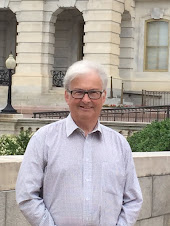There is of course a Presidential Library and Museum (http://www.jfklibrary.org/), but my post today is about building one's own JFK Library. With the 50th anniversary of his death just a few days away, we have already seen a deluge of books; magazines and articles.
Some of course are obsessed with the various conspiracy theories - and it is possible to spend a small fortune "investing" in the many books (and films) about those. However this post will deal with books about his life and legacy. I have to admit that, like many people of my age - a child of the 1960s - I've been fascinated by the man that had such an influence on others. My parents had a number of books about him - which appeared before November 1963. While neither of them became politically involved (unlike their son!), clearly JFK had inspired them as young parents at the dawn of the 1960s. When I made my first visit to Washington DC I met many people, then on the verge of retirement, who had entered public service as the direct result of being inspired by Kennedy. What a tremendous legacy.
Over the years I acquired or bought some of the most well known books about him. I still have (though it is beginning to fall apart), a copy of the Warren Commission Report. ($1 it cost when first published); 'Profiles in Courage' and 'Why England Slept' (second hand copies picked up in the days when most towns had lots of second hand bookshops); William Manchester's " The Death of A President" has long resided in my library. Theodore Sorensen's "Kennedy" has recently moved from the bookshelves to the side of my bed as I re-read it. Robert Dallek's "John F Kennedy: An unfinished Life" is on the bookshelf, while his recent "Camelot's Court" has been keeping me awake as an audiobook. Richard Reeves' "President Kennedy" is another "heavy-weight" (though very readable book). I have Rose Kennedy's autobiography and Barbara Leaming's "Jack Kennedy: The Making of a President". The Cuban Missile Crisis has its own literature - starting with Robert Kennedy's "Thirteen Days". The UK's Stationery office (TSO) has also produced a useful collection of documents in "The Cuban Missile Crisis: 1962). Michael Dobbs (the one who wrote for the Washington Post, NOT the author of the excellent "House of Cards" [and a Tory Peer]) has produced "One Minute to Midnight". I have a couple of books on the Kennedy Tapes - a 2012 book "Listening In" edited by Ted Widmer which includes two CDs of over two hours of recordings, plus May & Zelikow's "The Kennedy Tapes: Inside the White House During the Cuban Missile Crisis".
If only there was time this month to reread (or relisten) to them all!
skip to main |
skip to sidebar

Washminster


For everyone interested in History and also the work of Britain's Parliament; the US Congress; the European Parliament and the French Parlement. Also deals with China and the European Union. Discusses Practice, Procedure, History and current issues.
Washminster
Washminster
About Me

- J David Morgan
- Milton Keynes, United Kingdom
- Retired. An experienced lecturer, tutor and researcher with practical experience of working in the UK and European Parliaments. I have a keen academic and practical interest in the workings of both the UK Parliament and the US Congress. Over the years I have broadcast on both British and US Politics for BBC local radio stations and presented Platform:MK, Heritage:MK & Heritage Matters on Milton Keynes based Community Radio Stations.